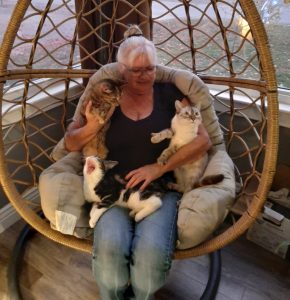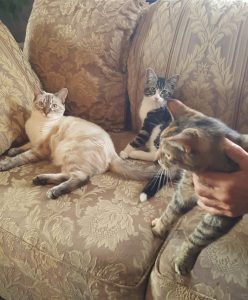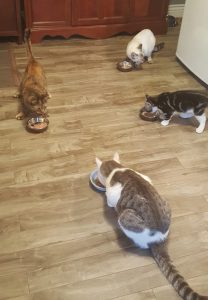There are special people in this world. People with big hearts willing to step up to give homeless animals with special needs a loving home and a second chance at the happiness they deserve. Lorelea Chandler is one of those people.
Lorelea and her husband Charlie MacKeen had been quietly saving stray cats for years. They dedicated their time without fanfare or publicity. Four years ago, they adopted a kitten with Cerebellar hypoplasia and since then, two more kittens with the disorder have found their way into their heart and home.

Cerebellar hypoplasia (CH) is a neurological condition in animals where the cerebellum of the brain doesn’t develop properly. It ranges in severity from a minor wobble in an animal’s walk to extreme difficulty moving around. Kittens with CH require special families to adopt them that will be patient and understanding of their physical challenges. Some folks may not be up for this, but Lorelea was – three times! Count ‘em – cuties Ava, Betty and Collins – all from the SPCA Kings Shelter.
Lorelea relates “I wasn’t looking to adopt any special needs kittens since we already had two older cats at home. Ava, our first adorable CH kitten literally landed in my lap in 2016 through my granddaughter’s urging.” This June, Lorelea heard about kitten Betty with CH on the radio. “I just had to call about her and when I went to see her, I fell in love at first sight and brought her home,” she explains. And Collins? Lorelea shares “I have a friend that works at the Kings Shelter and she messaged me in September saying they had another kitten with CH. I told her that we already have 3 cats and my hubby would kill me if I adopted another CH kitten. But I mentioned Collins to Charlie and he good-naturedly said to bring him home.”

The 3 kittens span the spectrum of CH symptoms. “Betty is the least affected. She can almost walk, run and play like a normal cat,” reports Lorelea. “She does have some eyesight problems, seeming to chase things that aren’t always there.” Ava is the most affected by CH. “She has difficulty navigating stairs and can’t go more than a few feet before stumbling. She can’t jump like a normal cat, but she’s adapted by pulling herself up with her front legs if she wants to climb. She also has tremors when she’s excited,” Lorelea explains. Collins is somewhere in between. “He wobbles and has tremors when he’s tired or has just woken up. He’s full of mischief, playfully jumping on Betty’s back which Betty doesn’t mind at all,” chuckles Lorelea. “Our older cat Dicky gets along great with the kittens; he’s just like a mother hen!” she laughs.

CH kitties aren’t defined by their limitations. What they may lack in coordination, they definitely make up for in determination. Case in point, Ava. “One day, I was outside with Ava (closely supervised by me) and chatting with a friend,” relates Lorelea. “We suddenly saw Ava walking slowly up the front steps! I got behind her to make sure she didn’t fall and let her go for it. When she reached the top, the look on her face was priceless – it was like ‘Hey mom, did you see what I just did?!’ I was so proud of her.”
“There are so many happy moments with the kittens and they are a true source of inspiration,” says Lorelea. While many people may overlook homeless pets with special needs in search of the ‘perfect pet’ Lorelea looks at it this way………… “I find animals and people are a lot alike. We all have certain needs and there are some things we can and cannot do. The kittens may not be able to do some things like cats without CH, but I let them try as long as there is no danger of them getting hurt. As for me, I can’t sing or dance, but I try anyway!”
And Lorelea’s advice to anyone considering adopting a special needs pet? “You won’t see a special needs pet; you’ll see a pet that needs love. They deserve a chance to show you how awesome they are and you’ll be rewarded by unconditional love and gratitude.”
Understanding the commitment involved in adopting a special needs pet is crucial to a happy healthy relationship. There are important things to consider before adopting a pet with special needs.
- Think about any long-term dietary requirements, special medications or treatments your pet will need. Pets with behavioral issues may need special training; those with mobility challenges may need therapy or surgery. Ensure you can fit these costs into your family’s budget.
- Your pet may need medications/injections at specific times of day. Ensure you’re available to do this.
- Talk with your family about the challenges that come with adopting a special needs pet and ensure everyone’s onboard.
- Your pet may need more frequent vet visits. Pets with an injury or physical disability may need assistance with standing or walking. Some may need you to physically accompany them outside for bathroom breaks, as opposed to simply being let out.
The Nova Scotia SPCA makes every effort to place special needs pets with their perfect human match. Before deciding to adopt, speak to shelter staff since they’re familiar with the animal and consult with your vet to get a good understanding of the pet’s ongoing requirements. Whatever the pet’s special needs, the SPCA will be there before and after adopting to support you by providing information and advice.
